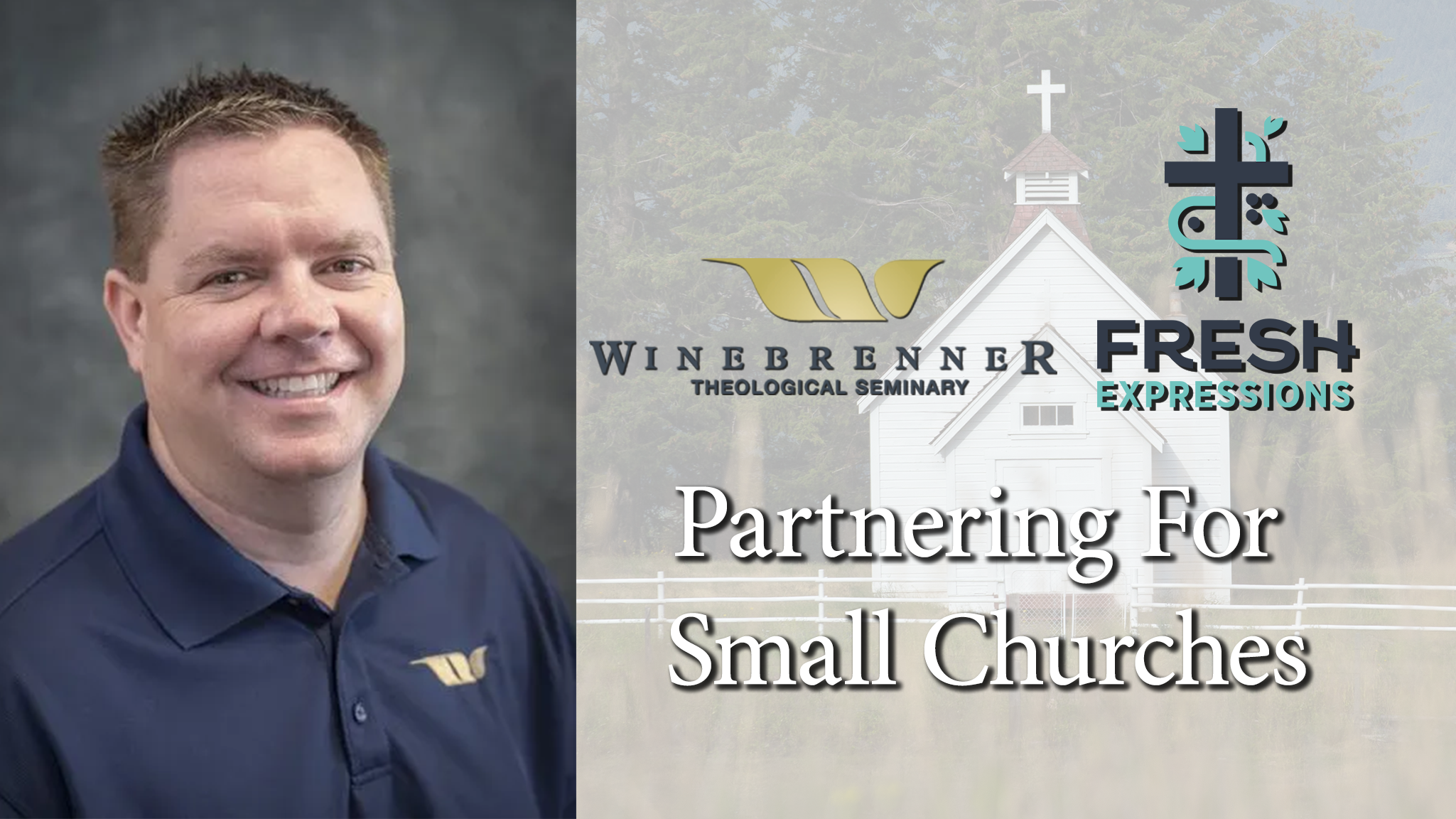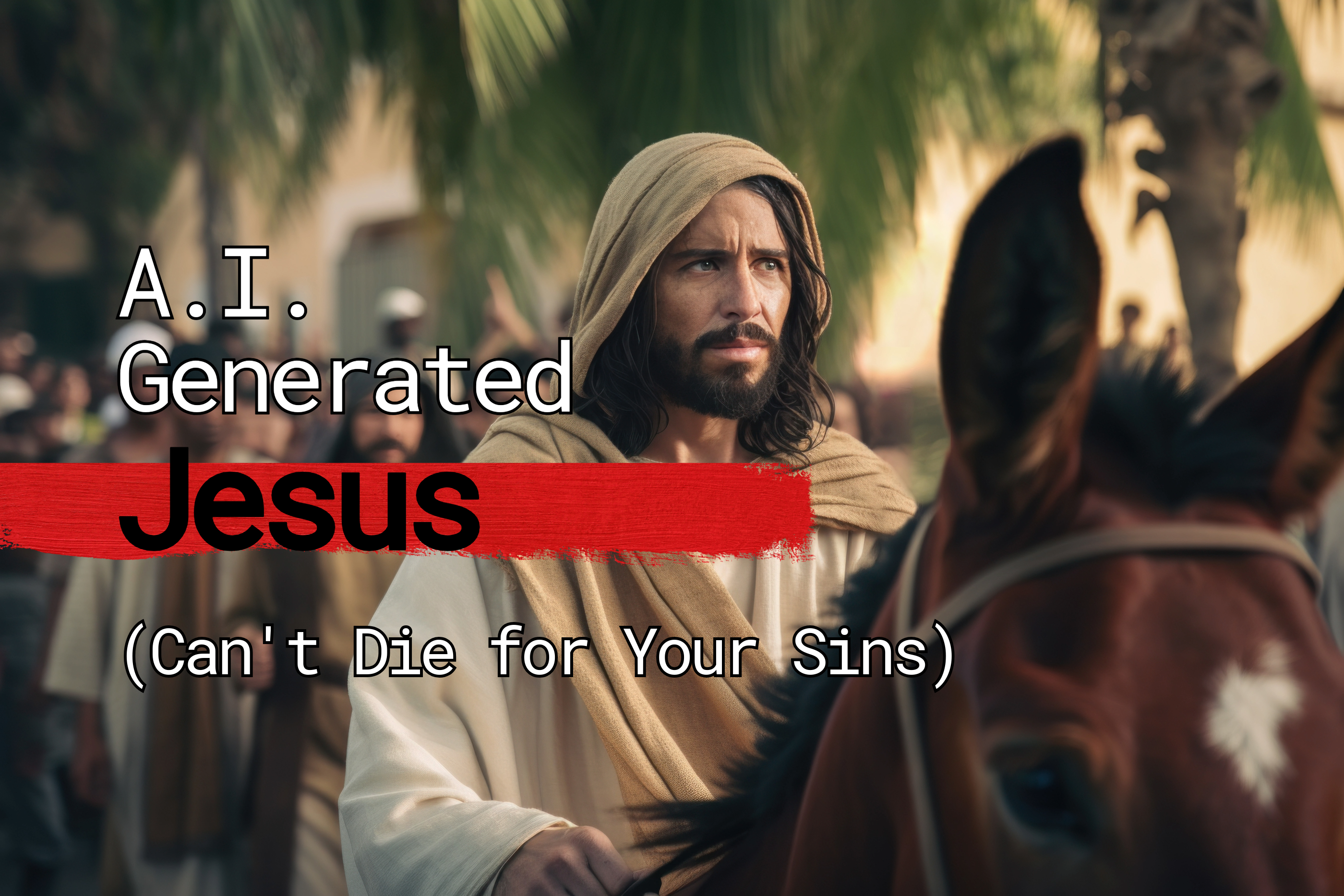
We sat down with Winebrenner Theological Seminary President Dr. Brent Sleasman to hear more about the investment the seminary is making in training outside of the classroom. Winebrenner is sponsoring a day of learning and training from Fresh Expressions. Small Church Week is a 5–day training event for pastors and church leaders from January 29th – February 2nd, and the best part; registration is free. The focus for the event is on helping small churches realize the importance of the context they are in, and how to adapt and overcome common obstacles. Winebrenner believes in the event so much that they wanted to sponsor one of the days. The CGGC also believes Small Church Week is an excellent opportunity for our pastors and church leaders, regardless of the size of their church, to get quality training on what’s coming in 2024, and how to think differently about making an impact on their community for Christ. So, we hope you register for a week’s worth of content, interaction, and support.
Watch a highlight here and read the full interview below.
Welcome Brent, good to be with you. Why did Winebrenner decide to partner with Fresh Expressions on this Small Church Week.
Fresh Expressions has been a great partner with Winebrenner. I’ve gotten to know both the work that they’re doing as well as some of the folks involved. So, as we in theological education try to think about the industry that’s rapidly changing, whether you think about hybrid education, or what we do in education and teaching, Fresh Expressions of what we do have caused us to really think “how do we help our students to think about fresh expressions in their own ministry settings?” Whether it’s a church planter or as a small church leader; whether its co-vocational leadership, leading a non-profit, paid or unpaid, Fresh Expressions for me is just a way to think about what the church looks like in 2024 and the future is different than it was when you and I and others went through Winebrenner, or served in churches previously. It’s a fresh expression trying to capture the biblical language. Things look different today than they have in the past.
How do partnerships like this helps advance Winebrenner’s mission, as you think about equipping leaders for service in God’s Kingdom?
We’re entering a season in which we’re thinking about some new strategic priorities, one of those is collaboration, along with discipleship and stewardship. And so, one, it helps us fulfill our strategic goals of collaboration, and even deeper than that, I think collaborating with the Churches of God, General Conference, partnering with regions in the denomination, and partnering with Fresh Expressions is really representative of kingdom work. When we think about what it means to really live out Jesus’s kingdom initiatives here on earth, we are going to partner with other people. It’s finding people who share some of [our] priorities and we can actually help them move forward. So, what Winebrenner provides fresh expression is this… we have conversations, we provide support, and we provide access to students but then it’s also a benefit for our students. For all those students who are in different settings, it’s one more point of information that’s free, that really helps them build their own theological education as they look toward wherever God is calling them in the future.
You know that Winebrenner is a pretty diverse community. Lot’s of folks coming from lots of different states, lots of contexts. So do you have a sense of how many of your students are coming from a small church context.
You know it’s interesting. I’m teaching a strategic ministry development course and we just met last night. Within that class we have paid staff within smaller churches, we have paid staff within larger churches as well. We have nonpaid folks that work within a smaller church setting. We have church planters who may have a smaller church now but they are looking hopefully to going grow. Sometimes these things overlap with rural and urban, and we could start to think about it in layers. There could be some rural small churches, or urban small churches.
I think that at Winebrenner, we have students that are paid, unpaid, large and small church, and co-vocational. So, in the student body, it’s very much diverse, in that way.
One of the things that’s usually lost on us is just the reality of North America. 70% of the congregations in North America are churches that are under 100 in worship attendance on a given weekend. That’s largely what we see in the Churches of God. Our numbers are probably a little higher than that national average. What do you hope to see made available to local churches? How do you see it helping local congregations in the CGGC and beyond the CGGC?
I remember years ago, there was a book by Lyle Schaller, that’s a throwback for people who remember church growth literature from some decades ago. But in one of his books, he talked about, to use an animal analogy; that a puppy becomes a dog, and we think that a small church is just a large church but smaller. But Shaller’s point is that they are totally different animals. We can’t say that “whatever we do at a large church, we just need to scale it down for a small church.”
One of Fresh Expressions’ points, and I would agree, a lot of the training comes from a larger church perspective, maybe a more urban church perspective. There is funding, flexibility, and technology. Folks, and you know who you are, you may not have time because you are working several jobs, you have a family, and you may have several churches you’re serving. You may not have time to do a podcast, or write a blog, or be producing books.
What [Small Church Week] provides are folks who are in leadership in small church settings that are giving voice to some of the things that are unique in comparison to what some of the other resources are.
For Winebrenner, it’s both trying to give to our students, and there may be students who come from Fresh Expressions. “Hey, there is this seminary that is attentive to the idea that there are unique needs for the small church.” So, if there is somebody form Fresh Expressions, from their circle, they could become aware of Winebrenner. This is what sponsorship does. They could seek us out for furthering their education as well.
I know that one of Fresh Expression’s hopes for this week is to be able to equip the average North American church leader for the opportunities that are coming in 2024. From where you sit, what do you think some are the opportunities in 2024 and beyond for churches and for Christian leaders?
Well, I’ll admit that sometimes what I think of as an opportunity, someone else might call an obstacle or a challenge. So, I think there are opportunities in those challenges. We continue to live in a culture where folks aren’t necessarily going to church because it’s a cultural norm. Especially in communities where small churches find themselves. Some folks really have a nostalgia for a time in the past where people just went to church because it was something that they could do.
I think what a small church does is to really provides an entry point that it’s not intimidating. You can meet people. You know, at our church, a few weeks ago, somebody was sharing that the reason they go is to make friends. That’s not a criticism.
Why do people come to the small church? They come for the relationships. They come for the conversations. They come because the ministry has a focus that is incarnational in the immediate community. We’ve got to reconcile with where we privilege and how we think about things.
As we look at millennials and Gen Z, and the changes in some of the generations, the idea of giving, time investment, or prioritization, is going to be local community oriented, and what small churches do is, they have a pulse in their communities. So, I think some of those trends in 2024… there are obstacles there, but we will continue to see local evidence. Whether it’s their giving, or their work. But the benefit is that you can really see tangible things there. So, 2024 is a long year, but those are just a few of the things that are here now, but will become clearer as we move into the future.
Winebrenner has been on a really interesting journey, and I think an exciting journey. You’ve all had to pivot as an institution and learn some new ways to do things educationally, and you’re seeing good results from that. You’re seeing growth. You’re able to serve students now that you weren’t serving now. Do you think there are comparisons for the local church? Thinking about new ways of reaching people that will allow us to reach the people we are not reaching right now?
I’ll use the concept of community. I’m just going to take one of the major talking points, online education, as an example. I know in our context, a lot of people have nostalgia and a preference for an in-person classroom because that’s the way we went through, and because they like the community. I agree that community is important, but what we have access to, thinking online and distributed: community is still important, but it’s taking community which was lead by a professor in a classroom, and saying “hey, you are in a church in Texas, your community is that context.”
You may be in a church in central Pennsylvania, your community is your context. I think about that because the program model had to change. In the small church, we have people from a discipleship perspective who are anchored in the playhouse, or the local school, or a retail setting, and their home as a stay-at-home parent, and the church. And I think that if we can change how we think about programs, and maybe move toward a little more of a discipleship model, where the gathering of the small church really provides a forum for people to tell the story of how God is at work in their context.
That’s been a shift for Winebrenner, it’s what we need to think about. Community is still important, very important. But it’s not in the traditional way in the physical classroom. It’s finding community where students are anchored, and when we come together for class in that virtual format, it’s space to learn together, because we are already anchored in those communities. So, I think sometimes in an church setting, we think the gathering is the most important thing. And we almost ignore the settings we are in. It's recapturing the settings we are in. It’s where we are supposed to be. That’s the kingdom work. What we do when we come together is to celebrate and worship so we can go back out and be the church in those settings.
So, really, equipping the people so they can go back into those local contexts where they are already rooted and established in their mission fields, so to speak.
Thank you, Brent. And thank you to Winebrenner for sponsoring a day of Fresh Expressions. We hope you will take advantage of this opportunity. All you need to do is register online, and you can register here:
Register for Small Church Week
We hope, again, that your church will take advantage of this great opportunity that’s really designed for you, and the challenges that you face in a small church, where you don’t necessarily have 100 volunteers, or you don’t have the biggest resource in town to leverage for the Kingdom, and yet God is still giving you great opportunity for this coming year, and the years beyond.
Have a great day, and God bless.
Lance
CGGC eNews—Vol. 18, No. 3





Login To Leave Comment